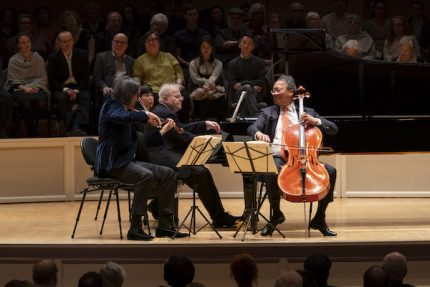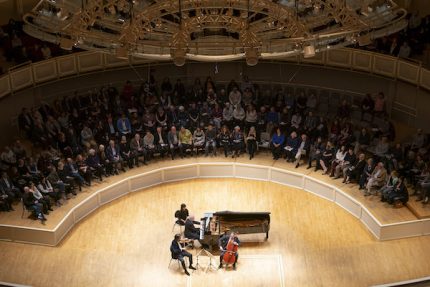Beethoven among friends with Ma, Ax, and Kavakos

The Beethoven Express continues to accelerate down the highway.
Chicago is marking the composer’s 250th birthday year with several projects. In addition to John Eliot Gardiner’s cycle at the Harris Theater this past week, Riccardo Muti’s season-long CSO symphony series continues and the cycle of Beethoven’s complete piano sonatas returns later this month with two installments by Sir Andras Schiff.
There are plenty of one-off events as well, including the concert of Beethoven piano trios presented Monday night by the starry trio of Yo-Yo Ma, Emanuel Ax and Leonidas Kavakos. In yet another of several packed events at Orchestra Hall in recent weeks, the audience overflowed to three long rows of onstage seating. Build a Yo-Yo concert and they will come.
The program, which offered three of Beethoven’s most substantial works in the genre, started nearly fifteen minutes late and ran long but with music-making on this level no one seemed to be complaining.
Cellist Ma and pianist Ax have been friends and regular chamber collaborators for decades, while violinist Kavakos is a relatively recent member of the team. In their program of Brahms’ complete trios two years ago, the Greek violinist didn’t always seem entirely integrated stylistically with his colleagues.
That was not the case Monday night. The performances by Ma, Ax and Kavakos had seamless cohesion and fine unanimity of purpose throughout. The only slight debit was the tonal dryness and lack of shimmer on the string soloists, an unfortunate byproduct of the ill-fated 1997 hall renovation.

The evening started at the beginning, with the Trio No. 3 in C minor from Beethoven’s Op. 1 set. Even here in his first published music, the composer’s restless drama and pensive introspection are firmly manifest. The sturm und drang was put across by the players while keeping the music in scale. There was a wonderful ease to the give and take throughout—vividly characterizing the contrasting moods of the Andante’s variations, punching out the gruff accents of the Menuetto, and throwing off the turbulent energy of the finale, with an artful slowing of the tempo for the hushed surprise coda
Ax’s playing was especially inspired, here and indeed throughout the evening, with the pianist’s gracious ease, nimble articulation and expressive poise always put wholly at the service of the music.
A grazioso quality reigns in the Piano Trio in E flat, Op, 70, no. 2, and the musicians brought out the lilting lyricism, buoyant rhythms and easy-going charm of this music winningly, with a beguiling light touch.
Inevitably, the evening closed with the “Archduke” Trio in B flat, the Big Daddy of the piano trio genre. Even here, Ma, Ax and Kavakos managed to make the nonstop flow of familiar melodies sound remarkable fresh. The performance abounded in inspired moments: the players’ relaxed enjoyment of the expansive opening movement, and the deliciously piquant pizzicato section; the Scherzo’s buoyant good humor, and the nostalgic expression of the Andante cantabile. The bumptious charm of the finale was especially delightful, played with the sense of relaxed intimacy and infectious enjoyment of chamber music at its finest.
With the concert running long and the lights coming on, it was made clear that there would be time for only one encore. As it turned out, the gentle, inward performance of the Adagio from Beethoven’s Trio in B-flat Major, Op. 11, provided an ideal coda to the evening.
The program will be repeated 2 p.m. Sunday at Carnegie Hall. carnegiehall.org